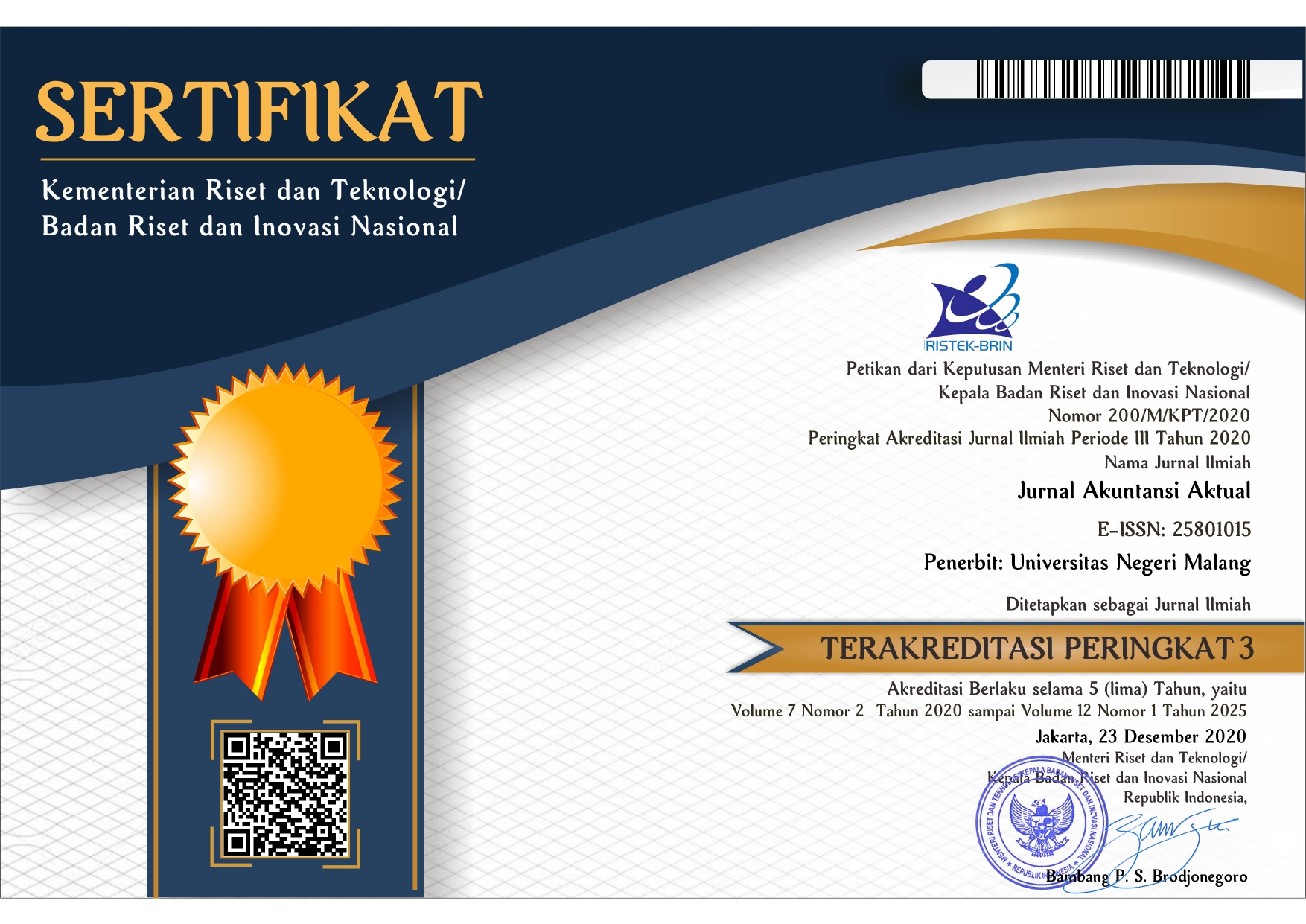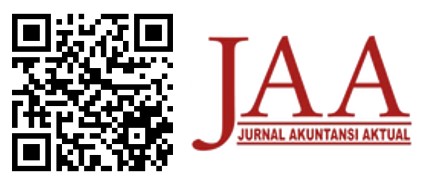Konflik kepentingan dan keterlibatan auditor: sebuah studi fenomenologi
Abstract
Abstract
This study aims to show the involvement of auditors in conflicts of interest with company management. This study indicates that conflicts of interest might arise between auditors and company management with indicators can be noticed during the audit process. This study employs a qualitative approach and phenomenological method to reveal the phenomenon of conflict of interest between auditors and company management. The study was carried out in a hospital as an audit client and a public accounting firm as an auditor in East Java. The results demonstrated that there was a conflict of interest between auditors and clients based on economic dependency, career threats, and ethical dilemmas experienced by auditors, thereby lowering independence, professionality, and scepticism.
Abstrak
Penelitian ini bertujuan untuk mengungkapkan keterlibatan auditor dalam konflik kepentingan dengan manajemen perusahaan. Penelitian ini berfokus pada bagaimana konflik kepentingan dapat muncul antara auditor dan manajemen perusahaan dan indikasi konflik kepentingan tersebut terlihat selama proses audit berlangsung. Penelitian ini menggunakan pendekatan kualitatif dan metode fenomenologi untuk mengungkapkan fenomena konflik kepentingan di antara auditor dan manajemen perusahaan. Objek penelitian dilakukan di salah satu rumah sakit sebagai klien audit dan kantor akuntan publik sebagai auditor yang berada di Jawa Timur. Hasil penelitian menunjukkan bahwa terjadi konflik kepentingan antara auditor dan klien perusahaan yang didasarkan pada ketergantungan ekonomi, ancaman karir, serta dilema etis yang dialami oleh auditor sehingga mengurangi sikap independen, profesional, dan skeptis.
Keywords
Full Text:
PDFReferences
Allam, A., Ghattas, N., Kotb, A., & Eldaly, M. K. (2016). Audit Tendering in the UK: A Review of Stakeholders’ Views. International Journal of Auditing, 21 (1), 11-23. doi:10.1111/ijau.12076.
Assydiq, G. G. G. (2018). Dimensi Pelanggaran Etika Praktik Akuntansi. Jurnal Akuntansi Multiparadigma, 4 (2), 216-237. doi: 10.18202/jamal.2013.08.7194.
Cameran, M., Livatino, M., Pecchiari, N., & Vigano, A. (2002). The Impact of Mandatory Audit Rotation on Audit Quality and on Audit Pricing: The Case of Italy. Working Paper.
Cameran, M., Ditillo, A., & Pettinicchio, A. (2018). Audit Team Attributes Matter: How Diversity Affects Audit Quality. European Accounting Review, 27(4), 1-27. doi: 10.1080/09638180.2017.1307131.
Chen, C-Y., Lin, C-J., & Lin, Y-C. (2008). Audit Partner Tenure, Audit Firm Tenure, and Discretionary Accruals: Does Long Auditor Tenure Impair Earnings Quality?. Contemporary Accounting Research, 25(2), 415-445. doi:10.1506/car.25.2.5.
Chi, W. & Huang, H. (2005). Discretionary Accruals, Audit Firm Tenure and Audit-Partner Tenure: Empirical Evidence from Taiwan. Journal of Contemporary Accounting and Economics, 1(1), 65-92. doi:10.1016/S1815-5669(10)70003-5.
Chi, W., Myers, L. A., Omer, T. C., & Xie, H. (2017). The Effects of Audit Partner Pre-Client and Client-Specific Experience on Audit Quality and on Perceptions of Audit Quality. Review of Accounting Studies, 22(1), 361-391. doi:10.1007/s11142-016-9376-9.
Chung, H. (2004). Selective Mandatory Auditor Rotation and Audit Quality: An Empirical Investigation of Auditor Designation Policy in Korea. (Doctoral’s Dissertation, Purdue University, West Lafayette, Indiana, U.S.). https://docs.lib.purdue.edu/dissertations/AAI3154606/.
CLSA. (2010). CG Watch 2010: Stray Not into Perdition. https://www.acga-asia.org/cgwatch-detail. php?id=153 .
Dahrendorf, R. (1959). Class and Conflict in an Industrial Society . London: Routledge.
Dewi, L. K. & Ludigdo, U. (2012). Akuntan Publik dalam Penegakan Kode Etik Profesi. Jurnal Ilmiah Mahasiswa FEB Universitas Brawijaya, 1 (2), 8-26.
Endaya, K. A. & Hanefah, M. M. (2016). Internal Auditor Characteristics, Internal Audit Effectiveness, and Moderating Effect of Senior Management. Journal of Economic and Administrative Sciences, 32(2), 160–176. doi: 10.1108/jeas-07-2015-0023.
Espada, J. C. (2016). The Anglo-American Tradition of Liberty: A View from Europe . London: Routledge. doi: 10.4324/9781315612430.
Fikri, A., Sudarma, M., Sukoharsono, E. G., & Purnomosidhi, B.. (2004). Studi Fenomenologi Akuntabilitas NonGovernmental Organization. Jurnal Multiparadigma, 1(3), 417–428. doi:10.18202/jamal.2010.12.7101.
Fitriaman. (2006). Ethical Behavior in the Government Internal Auditors Perspective ESQ. (Thesis, Universitas Brawijaya, Malang, Indonesia).
Gavious, I. (2007), Alternative Perspectives to Deal with Auditors’ Agency Problem. Critical Perspectives on Accounting, 18(4), 451-467. doi: 10.1016/j.cpa.2006.01.011.
Ghosh, A. & Moon, D. (2005). Auditor Tenure and Perceptions of Audit Quality. The Accounting Review, 80(2), 585-612. doi:10.2308/accr.2005.80.2.585.
Hartomo, G. (2019). Kronologi Kasus Laporan Keuangan Garuda Indonesia hingga Kena Sanksi. https://economy.okezone.com/read/2019/06/28/320/2072245/ kronologi-kasus-laporan-keuangan-garuda-indonesia-hingga-kena-sanksi.
Indonesian Institute of Certified Public Accountants (IICPA). (2014). Standar Audit 240: Tanggung Jawab Auditor Terkait dengan Kecurangan dalam Suatu Audit atas Laporan Keuangan. http:// spap.iapi.or.id/1/files/SA%20200/SA%20240.pdf .
Institut Akuntan Publik Indonesia (IAPI). (2020). Kode Etik Profesi Akuntan Publik 2020. https:// ubico.id/blog/kode-etik-akuntan-indonesia-2020/ .
Johnson, V. E., Khurana, I. K., & Reynolds, J. K. (2002). Audit-Firm Tenure and the Quality of Fiancial Reports. Contemporary Accounting Research, 19(4), 637-660. doi: 10.1506/LLTH-JXQV-8CEW-8MXD.
Junior, A. H. C & Walker, P. L. (1999). The International Debate over Mandatory Auditor Rotation: A Conceptual Research Framework. Journal of International Accounting, Auditing & Taxation, 8(1), 43-66. doi:10.1016/S1061-9518(99)00004-X.
Kirana, I. G. A. M. I, & Ramantha, I. W. (2020). The Effect of Auditor Rotation, Time Pressure, and Audit Tenure on Audit Quality with Auditor Specialization as Moderation Variable (Empirical Study of Manufacturing Companies Listed on the Indonesia Stock Exchange in 2014-2018). International Research Journal of Management, IT & Social Sciences, 7 (3), 126-136. doi:10.21744/irjmis.v7n3.931.
Matussek, K. (2020). Ernst & Young Seud Over Wirecard as Accounting Woes Add Up (1). https:// news.bloombergtax.com/tax-insights-and-commentary/ernst-young-sued-over-wirecard-audit-as-accounting-woes-add-up?context=article-related.
Milgram, S. (1974). The Dilemma of Obedience. Phi Delta Kappa International, 55(9), 603-606.
Moleong, L. (2014). Metodologi Penelitian Kualitatif. Edisi Revisi. Bandung: PT Remaja Rosdakarya.
Mueller, F., Carter, C., & Whittle, A. (2015). Can Audit (Still) be Trusted?. Organization Studies, 36(9), 1–33. doi:10.1177/0170840615585336.
Myers, J. N., Myers, L. A., & Omer, C. T. (2003). Exploring the Term of the Auditor-Client Relationship and the Quality of Earnings: A Case for Mandatory Auditor Rotation. The Accounting Review, 78(3), 779-799. doi:10.2308/accr.2003.78.3.779.
Nasution, S. (2013). Pengaruh Karakteristik Personal Auditor, Etika Audit dan Pengalaman Auditor terhadap tingkat Penyimpangan Perilaku dalam Audit. (Skripsi, UIN Syarif Hidayatullah, Jakarta, Indonesia). https://repository.uinjkt.ac.id/dspace/handle/123456789/23939.
Neu, D. (1991). Trust, Impression Management and the Public Accounting Profession. Critical Perspectives on Accounting, 2(3), 295-313. doi: 10.1016/1045-2354(91)90015-6.
Nguyen, P. T. & Kend, M. (2017). The Perceived Motivations behind the Introduction of the Law on External Audit in Vietnam. Managerial Auditing Journal, 32 (1), 90-108. doi: 10.1108/MAJ-01-2016- 1299.
Noviriani, E., Ludigdo, U., & Baridwan, Z. (2012).Studi Fenomenologi atas Dilema Etis Auditor Internal Pemerintah. Ekuitas: Jurnal Ekonomi dan Keuangan, 19(2), 217-240.doi: 10.24034/ j25485024.y2015.v19.i2.86.
Nugraha, E., Nugroho, L., & Dwijayanty, R. (2018). Rotasi Audit Sebuah Kajian Fenomenologis. Seminar Nasional dan Diskusi Panel Multidisiplin Hasil Penelitian & Pengabdian kepada Masyarakat, 1 (1), 165–170.
Pemerintah Indonesia. (2015). Peraturan Pemerintah (PP) Nomor 20 Tahun 2015. Lembar Negara 2015 Nomor 79, 6 April 2015. Jakarta: Sekretariat Negara.
a.Rini, D. D. O., Hariyanto, W., & Gustiana, R. D. (2018). Independence and Audit Experience as an Alternative Assessment of Audit Quality and Overcoming Audit Tenure. Seminar Nasional dan The 5th Call for Syariah Paper (SANCALL) 2018 . https://publikasiilmiah.ums.ac.id/ handle/11617/10430.
Saerang, D. P. E. (2003). Accountability and Accounting in a Religious Organisation: An Interpretative Ethnographic Study of the Pentecostal Chruch of Indonesia. (Doctoral’s Thesis, University of Wollongong, Wollongong, Australia). http://ro.uow.edu.au/cgi/viewcontent.cgi?article=2902&co ntext=theses.
Sanders, P. (1982). Phenomenology: A New Way of Viewing Organizational Research. Academy of Management Review, 7 (3), 353–360. doi:10.5465/amr.1982.4285315.
Saputra, K. A. K., Juniariani, N. M. R., Jayawarsa, A. A. K., & Darma, I. K. (2019). Conflict of Interest dan Independensi Auditor pada Kantor Akuntan Publik di Bali. Jurnal InFestasi, 15 (1), 1-9. doi: 10.21107/infestasi.v15i1.5478.
Sinason, D. H., Jones, J. P., & Shelton, S. W. (2001). An Investigation of Auditor and Client Tenure. American Journal of Business, 16(2), 31-40. doi:10.1108/19355181200100010.
Siregar, S. V., Amarullah, F., Wibowo, A., & Anggraita, V. (2012). Audit Tenure, Auditor Rotation, and Audit Quality: The Case of Indonesia. Asian Journal of Business and Accounting, 5(1), 55–74.
Tian, J. & Xin, M. (2017). Literature Review on Audit Opinion. Journal of Modern Accounting and Auditing, 13(6), 266-271. doi:10.17265/1548-6583/2017.06.003.Tittenbrun, J. (2013). Ralph Dahrendorf’S Conflict Theory of Social Differentiation and Elite Theory. Innovative Issues and Approaches in Social Sciences, 6(3), 117-140. doi:10.12959/ISSN.1855-0541.IIASS-2013-NO3- ART07.
Trevino, L. K. & Brown, M. E. (2004). Managing to be Ethical: Debunking Five Business Ethics Myths. Academy of Management Perspectives, 18(2), 69-81. Doi:10.5465/ame.2004.13837400.
Tuanakotta, T. M. (2013). Mendeteksi Manipulasi Laporan Keuangan . Jakarta: Salemba Empat.
Widyaningsih, I. A., Harymawan, I., Mardijuwono, A. W., Ayuningtyas, E.S., & Larasati, D. A. (2019). Audit Firm Rotation and Audit Quality: Comparison before vs after the Elimination of Audit Firm Rotation Regulations in Indonesia. Cogent Business & Management, 6 (1), 1-15. doi :10.1080/23311975.2019.1695403.
Wilson, A. B., McNellis, C., & Latham, C. K. (2018). Audit Firm Tenure, Auditor Familiarity, and Trust: Effect on Auditee Whistleblowing Reporting Intentions. International Journal of Auditing, 22(2), 113-130. doi:10.1111/ijau.12108.
World Bank. (2010). Report on the Observance of Standards and Codes (ROSC). http://www. worldbank.org/ifa/rosc_cg.html .
Yefni & Sari, P. (2021). Akankah Fee Audit dan Karakteristik Auditor Menentukan Kualitas Audit?. Jurnal Akuntansi Multiparadigma, 12 (1), 173-185. doi:10.21776/ub.jamal.2021.12.1.10.
Zubairu, U., Ochepa, A., Umar, H., Kolo, R., Umar, J., & Usman, A. (2019). Audit Retention Versus Audit Rotation: An Update of the Debate. Journal of Accounting, Finance and Auditing Studies, 5(3), 76-87. doi:10.32602/jafas.2019.32.
DOI: http://dx.doi.org/10.17977/um004v9i12022p001
Refbacks
- There are currently no refbacks.

This work is licensed under a Creative Commons Attribution-ShareAlike 4.0 International License.
Jurnal Akuntansi Aktual is indexed by:

















